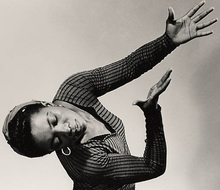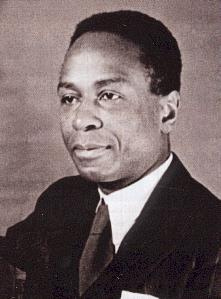Related Research Articles

Pearl Eileen Primus was an American dancer, choreographer and anthropologist. Primus played an important role in the presentation of African dance to American audiences. Early in her career she saw the need to promote African dance as an art form worthy of study and performance. Primus' work was a reaction to myths of savagery and the lack of knowledge about African people. It was an effort to guide the Western world to view African dance as an important and dignified statement about another way of life.

George Padmore, born Malcolm Ivan Meredith Nurse, was a leading Pan-Africanist, journalist, and author. He left his native Trinidad in 1924 to study medicine in the United States, where he also joined the Communist Party.

Robert Hooks is an American actor, producer, and activist. Along with Douglas Turner Ward and Gerald S. Krone, he founded The Negro Ensemble Company. The Negro Ensemble Company is credited with the launch of the careers of many major black artists of all disciplines, while creating a body of performance literature over the last thirty years, providing the backbone of African-American theatrical classics. Additionally, Hooks is the sole founder of two significant black theatre companies: the D.C. Black Repertory Company, and New York's Group Theatre Workshop.
Anton Phillips is a Jamaican-born British actor who found success appearing in British television. He remains best known for his role as Dr. Bob Mathias in the science fiction series Space: 1999. Also a theatre producer and director, he has been involved over the years with many initiatives to showcase high-quality professional theatre by and for black people, including the Carib Theatre Company, co-founded with Yvonne Brewster in 1980.

Shauneille Gantt Perry Ryder was an American stage director and playwright. She was one of the first African-American women to direct off-Broadway.
The Negro Ensemble Company (NEC) is a New York City-based theater company and workshop established in 1967 by playwright Douglas Turner Ward, producer-actor Robert Hooks, and theater manager Gerald S. Krone, with funding from the Ford Foundation. The company's focus on original works with themes based in the black experience with an international perspective created a canon of theatrical works and an audience for writers who came later, such as August Wilson, Suzan-Lori Parks, and others.

Edric Esclus Connor was a Caribbean singer, folklorist and actor who was born in Trinidad and Tobago. He was a performer of calypso in the United Kingdom, where he migrated in 1944 and chiefly lived and worked for the rest of his life until he died following a stroke in London, at the age of 55.
Enda Walsh is an Irish playwright.

The World Festival of Black Arts, also known as FESMAN, is a month-long culture and arts festival that takes place in Africa. The festival features poetry, sculpture, painting, music, cinema, theatre, fashion, architecture, design and dance from artists and performers from around the African Diaspora.
William Blackwell Branch was an American playwright who was also involved in many aspects of entertainment, including journalism, media production, editing, a short-lived career acting for television as well as talking on the radio. He "wrote, directed, and produced extensively for the stage, television, radio, and his own media consulting and production firm".
NTW can refer to:
Yulisa Amadu Pat Maddy was a Sierra Leonean writer, poet, actor, dancer, director and playwright. Known by his friends and colleagues as Pat Maddy or simply Prof, he had an "immense impact" on theatre in Sierra Leone, Nigeria and Zambia.
Obi Benue Egbuna was a Nigerian-born novelist, playwright and political activist known for leading the Universal Coloured People's Association (UCPA) and being a member of the British Black Panther Movement (1968–72) during the years when he lived in England, between 1961 and 1973. Egbuna published several texts on Marxist–Black Power, including Destroy This Temple: The Voice of Black Power in Britain (1971) and The ABC of Black Power Thought (1973).
Yemi AjibadeListen, usually credited as Yemi Goodman Ajibade or Ade-Yemi Ajibade, was a Nigerian playwright, actor and director who, after settling in England in the 1950s, made significant contributions to the British theatre and the canon of Black drama. As an actor he is well-known for Dirty Pretty Things (2002), The Exorcist: The Beginning (2004) and Danger Man (1964). In a career that spanned half a century, he directed and wrote several successful plays, as well as acting in a wide range of drama for television, stage, radio and film.
The Keskidee Centre, or Keskidee Arts Centre, was Britain's first arts centre for the black community, founded in 1971. Located at Gifford Street in Islington, near King's Cross in London, it was a project initiated by Guyanese architect and cultural activist Oscar Abrams (1937–1996) to provide under one roof self-help and cultural activities for the local West Indian community. Its purpose-built facilities included a library, gallery, studios, theatre and restaurant. The Keskidee became a hub for African and Afro-Caribbean politics and arts, and for years was the only place in London that produced black theatre, developing its own vibrant drama company and attracting both a black and white audience.
Pearl Connor-Mogotsi, née Nunez, was a Trinidadian-born theatrical and literary agent, actress and cultural activist, who was a pioneering campaigner for the recognition and promotion of African Caribbean arts. In the UK, in the 1950s, she was the first agent to represent black and other minority ethnic actors, writers and film-makers, and during the early 1960s was instrumental in setting up one of Britain's first black theatre companies, the Negro Theatre Workshop. In the words of John La Rose, who delivered a eulogy at her funeral on 26 February 2005: "Pearl Connor-Mogotsi was pivotal in the effort to remake the landscape for innovation and for the inclusion of African, Caribbean and Asian artists in shaping a new vision of consciousness for art and society."
New Heritage Theatre Group (NHTG) is the oldest Black nonprofit theater company in New York City, established in 1964. Through its multiple divisions: IMPACT Repertory Theatre, The Roger Furman Reading Series, and New Heritage Films, New Heritage gives training, exposure, and experience to new and emerging artists, playwrights, directors and technicians of color. New Heritage was founded by the late Roger Furman and is currently headed by Executive Producer Voza Rivers and Executive Artistic Director Jamal Joseph. NHTG presentations capture the historical, social, and political experiences of Black and Latino descendants in America and abroad.

A Wreath for Udomo is a 1956 novel by South African novelist Peter Abrahams. The novel follows a London-educated black African, Michael Udomo, who returns to Africa to become a revolutionary leader in the fictional country of Panafrica and is eventually martyred. The novel explores a revolutionary politics, exploring the diversity of actors and political communities needed to overcome colonial oppression.
Norma Morgan was an American printmaker and painter. Her work is found in major collections worldwide and she has been highly recognized for her etchings and engravings, many of which were inspired by time spent in Great Britain.
Pearl Priscilla Prescod was a Tobagonian actress and singer. She was one of the earliest Caribbean entertainers to appear on British television and was the first Black woman to appear with London's National Theatre Company.
References
- 1 2 Bourne, Stephen (14 February 2005). "Pearl Connor-Mogotsi | Trailblazer for African Caribbean arts in the UK" . The Independent . Archived from the original on 18 June 2022.
- 1 2 "Negro Theatre Workshop". George Padmore Institute . Retrieved 26 April 2021.
- 1 2 3 4 5 Chambers, Colin. "Black British Plays Post World War II -1970s". Black Plays Archive. National Theatre. Retrieved 27 April 2021.
- 1 2 3 4 "Negro Theatre Workshop, 1962–1967". The Geoge Padmore Institute. Retrieved 27 April 2021.
- ↑ William Blackwell Branch, "A Wreath for Udomo: A New Play Based Upon the Novel by Peter Abrahams", 1961.
- ↑ "William Branch Play Set For London Production", Jet, 14 September 1961, p. 59.
- ↑ "Off-Broadway, Regional & International", Tony Walton.
- ↑ "Meeting Point: Negro Theatre Workshop presents: The Dark Disciples". Radio Times . 31 March 1966. p. 17. Retrieved 27 April 2021.
- ↑ "Negro Theatre Workshop: 'The Dark Disciples'". 1966. Retrieved 27 April 2021.
- ↑ Bush, R. (2019). "Culture, race, and the welfare state: the British contribution to the 1966 First World Festival of Black and African Culture" (PDF). Research in African Literatures. 50 (2): 6. doi:10.2979/reseafrilite.50.2.03. hdl: 1983/0e4e7cba-ad36-4a3e-a3b4-b460117f62a4 . S2CID 165266661 . Retrieved 27 April 2021.
- ↑ Bonnelame, Natasha (7 September 2017). "Black British theatre: 1950–1979". Discovering Literature: 20th century. British Library . Retrieved 27 April 2021.